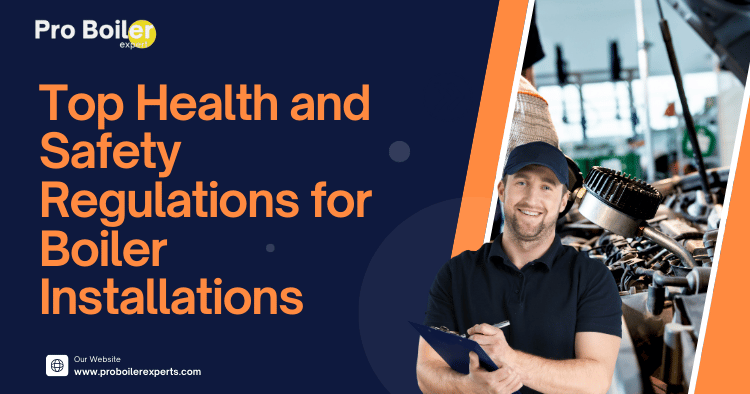Table of Contents
- Introduction
- Understanding Boiler Installations
- Key Health and Safety Regulations
- Importance of Compliance
- Common FAQs
- Conclusion
Introduction
Boiler installations are critical components in many industrial and commercial settings. Ensuring these systems are installed, maintained, and operated safely is paramount to protect both workers and the environment. In this blog, we will delve into the essential health and safety regulations governing boiler installations, providing you with the knowledge to navigate compliance with confidence.
Understanding Boiler Installations
Before we discuss the regulations, it’s essential to understand what boiler installations entail. A boiler is a closed vessel used to heat water or other fluids, typically for heating or power generation. Given their complexity, boilers can pose safety risks if not properly managed. Understanding the associated risks and regulations is vital for any business utilizing these systems.
“Safety is not just a set of rules; it’s a culture that needs to be ingrained in every aspect of operations.”
Key Health and Safety Regulations
The Health and Safety at Work Act 1974
The Health and Safety at Work Act 1974 serves as the cornerstone of occupational health and safety legislation in the UK. It sets out the general duties employers have towards their employees and others who may be affected by their work activities.
Key Points:
- Employers must ensure, as far as is reasonably practicable, the health, safety, and welfare of their employees.
- This includes proper training and supervision regarding boiler operations.
- Regular risk assessments must be conducted to identify potential hazards.
For more detailed information, visit the HSE website.
“Regular training is not just a compliance requirement; it’s an investment in the safety of your workforce.”
The Pressure Systems Safety Regulations 2000
The Pressure Systems Safety Regulations (PSSR) 2000 focus specifically on the safety of pressurized systems, including boilers. These regulations require that all pressure systems are designed, installed, and maintained to prevent danger.
Key Points:
- A Written Scheme of Examination (WSE) must be created for all pressure systems.
- Regular inspections and maintenance are mandatory.
- Any modifications to the system must be assessed for safety risks.
For in-depth guidance, check out the HSE’s PSSR guidance.
“Proactive maintenance is the key to preventing catastrophic failures in pressure systems.”
The Boiler (Safety, Health and Welfare) Regulations 1990
These regulations specifically address the safety, health, and welfare of employees working with or around boilers. It is essential to ensure that these systems are safe to operate and maintain.
Key Points:
- Boilers must be properly maintained and regularly inspected.
- Employees must receive adequate training on the risks associated with boiler operations.
- Safety devices must be installed and regularly tested.
Learn more about these regulations in the HSE Boiler Safety guidance.
“A well-maintained boiler is not just a legal requirement; it is a lifeline for your operation.”
The Control of Substances Hazardous to Health (COSHH) Regulations
COSHH regulations protect workers from the risks associated with hazardous substances, which can include chemicals used in boiler operations.
Key Points:
- Employers must assess the risks from hazardous substances and implement control measures.
- Employees should receive proper training on handling hazardous materials.
- Regular health monitoring may be necessary for employees exposed to hazardous substances.
For more information, visit the HSE COSHH guidance.
“Understanding the materials you work with is crucial for maintaining a safe workplace.”
Importance of Compliance
Compliance with health and safety regulations is not just a legal requirement; it’s also a fundamental aspect of good business practice. The benefits include:
- Increased Safety: Adhering to regulations helps prevent accidents and injuries, creating a safer workplace.
- Financial Savings: Avoiding fines and legal issues associated with breaches can save your business significant costs.
- Enhanced Reputation: A commitment to safety can enhance your company’s reputation, attracting clients and employees who value ethical practices.
“A company’s reputation for safety can be its greatest asset in a competitive market.”
Common FAQs
1. What are the consequences of non-compliance with boiler regulations?
Non-compliance can lead to severe penalties, including fines, legal action, and even closure of operations. More importantly, it can endanger lives.
2. How often should boilers be inspected?
Boilers should be inspected at least annually, but more frequent inspections may be necessary depending on usage and risk factors.
“Regular inspections are critical in identifying issues before they become major problems.”
3. Who is responsible for boiler safety in a workplace?
Ultimately, the employer is responsible for ensuring boiler safety, but employees also have a role in following safety protocols and reporting hazards.
4. What training is required for employees working with boilers?
Employees must receive training on the safe operation of boilers, emergency procedures, and how to identify and report safety risks.
“Empowering employees with knowledge is a cornerstone of a safe working environment.”
Conclusion
Navigating health and safety regulations for boiler installations can seem daunting, but understanding these key regulations can help you ensure compliance and create a safer work environment. By adhering to the Health and Safety at Work Act, the Pressure Systems Safety Regulations, the Boiler (Safety, Health and Welfare) Regulations, and COSHH, you can protect your employees and your business. Stay informed, stay compliant, and prioritize safety in your boiler operations!
For further reading, consider checking resources from the Health and Safety Executive to stay updated on the latest safety regulations and best practices.
Also Look For
For more insights on boiler types and their benefits, you can explore the following resources:
- Top 5 Benefits of Choosing Combi Boilers for Your Home
- Top 5 Benefits of Choosing a System Boiler for Your Home
- Top 5 Benefits of Conventional Boilers for Your Home
- Top 5 Benefits of Biomass Boilers for Eco-Friendly Heating
- Top Energy Efficiency Tips for Boiler Installation
These articles will provide you with more detailed insights into the various boiler options available and help you make informed decisions regarding boiler installations.





